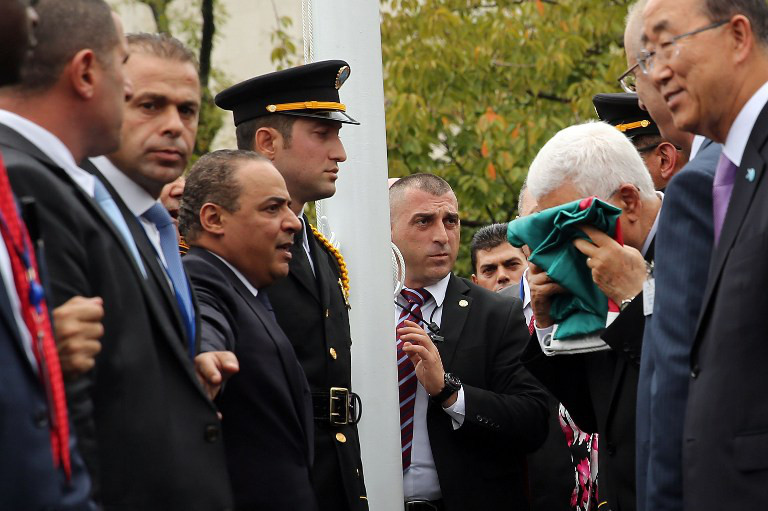The Palestinian flag flies for the first time at the United Nations headquarters after it was raised in a ceremony on Wednesday.
It was barely recognisable as a flag.
Clinging to the rain soaked pole, a strip of cloth with no immediately identifiable shape or national characteristics rose over the United Nations to clapping, cheers and an abundance of references to symbolism and hope.
Eventually a gust of wind caught it, and the black, green, red and white of the Palestinian flag fluttered free for the first time at the UN after the general assembly voted earlier this month to recognise the territory occupied by Israel as a state.
Diplomats and staff tramped across the rain-soaked grass of the UN’s Rose Garden on the banks of the East River to watch.
The UN secretary general, Ban Ki-moon, was the first to mention hope, although he was circumspect about what the flag-raising represented hope for. Not hope for a country anytime soon, but that one day it may happen, it seemed.
“This is a day of pride for Palestinians around the world. It is a day of hope. It’s a reminder that symbols are important,” he said. “May the raising of this flag give rise to the hope among the Palestinians and the international community that Palestinian statehood is achievable.”
It was also a reminder that symbols are not a substitute for a state.
“A flag is easy,” said a European official watching the ceremony. “There was a lot of noise against it from the Israelis and the Americans but at least it wasn’t a map. Just imagine trying to draw the borders.”
The Palestinian president, Mahmoud Abbas, proclaimed the flag-raising an omen. “The day of raising the flag over the state of Palestine is coming soon. Over Jerusalem, the capital of our state of Palestine,” he said.

Palestinian leader Mahmoud Abbas kisses the Palestinian flag before it is raised for the first time at the United Nations headquarters
Mahmoud Abbas: Palestinians ‘no longer bound’ by Oslo accords with Israel
It’s unlikely that anyone at the ceremony believed that. Just a few minutes earlier, Abbas had spoken at length to the UN’s general assembly about the failure of more than two decades of peace agreements and negotiation to deliver the much promised Palestinian state.
He sounded desperate and forlorn as he essentially declared the Oslo peace accords a failure , and threatened to walk away from them and let Israel resume the responsibilities and costs of full occupation.
Out in the Rose Garden, Ghadeer Tarazi, a Palestinian born in Jerusalem and raised in Ramallah before she found work at the UN, clapped as the flag went up.
“I’m so excited. It’s a great day for Palestinians and Palestine. It recognises the right of Palestinians to have a state. It’s a recognition that the whole world recognises it. But I hope it’s not just symbolic. I hope it translates into justice for the Palestinians,” she said.
Tarazi wasn’t sure that it would. She had listened to Abbas’s speech and wasn’t optimistic.
“I think change should happen. We should recognise that since Oslo nothing meaningful has happened that helped the Palestinian people. We cannot just go on like this,” she said.
And yet there is a widespread suspicion among Palestinians that things will just go on like this because it suits Israel and much of the rest of the world.
One Palestinian official, who did not want to be named, said Abbas, who is popularly known as Abu Mazen, was voicing what ordinary Palestinians have long believed: that Israel has not kept to its part of the Oslo agreement by blocking the creation of an independent state and that negotiations with Binyamin Netanyahu’s government will perpetuate the occupation not end it.
In short, that the Palestinian Authority acts not for the Palestinian people by in Israel’s interests.
“Netanyahu said long ago that Oslo was dead. Abu Mazen was just reaffirming it. He was saying, you may recognise us as a state at the UN but we are a state under occupation and you shouldn’t forget that,” he said.
“Right now Israel has a free pass. There are no consequences to occupation. The international community pays the costs of the occupation. Something has to change. Really it was an acknowledgement of defeat.”
So will the speech change anything? “I doubt it. Abu Mazen is losing credibility among the Palestinian people,” he said.
The ceremony over, the flag was hauled down to be transferred to a pole at the far end of the long line of national flags in front of the UN headquarters.
It will flutter alongside the Vatican, another non-country. – Guardian News & Media Ltd, 2015